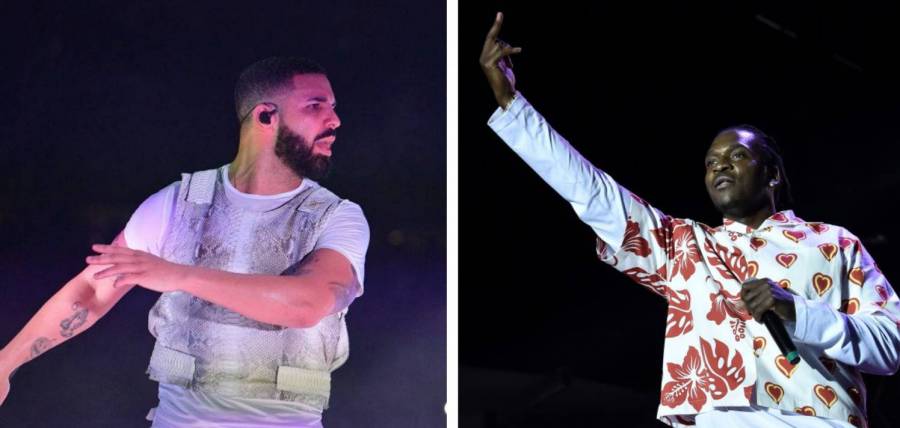Editorial – Amidst a pandemic and nationwide protests against police brutality, the Pusha T and Drake feud lives on.
A leaked track from Pop Smoke’s new album featuring Pusha T, Young Thug and Gunna found Push low-key dissing Drake. Thug called out Pusha for his lyrics, while Push clapped back and intimated that Drake is a snitch.
Drake didn’t squander the moment to respond during his latest singles run. He retorted a couple of shots both towards Push and Kanye West’s way through a U.K. rapper’s new song.
It’s just the latest round of drama that the younger half of the Clipse and October’s Very Own has been embroiled in for the past decade. It seems like the beef is always making headlines.
In a June interview with Rolling Stone, Noah “40” Shebib finally addressed Pusha T’s shots at him on the scathing, 2018 Drake diss, “The Story of Adidon.” 40 told Rolling Stone that Pusha’s bars about his multiple sclerosis made him feel “like shit.”
There’s no doubt about it: Pusha T crossed a line. Underhanded disses come with the territory of rap battles, but a person’s health should never be brought into the equation.
And yet, it should be remembered that Drake dealt the first low blow in regards to health. On the dual-Pusha T/Kid Cudi diss “Two Birds, One Stone,” Drake ridiculed Cudi over his mental illness and disease of addiction.
Both Push and Drizzy disgraced themselves by using someone’s health struggles to assert their superiority. This tactic is, ultimately, a weakness, and 40’s recent interview is a reminder that it has no place in Hip Hop in 2020. Especially not amidst a global pandemic that has claimed more than 400,000 lives worldwide.
One might note that, in Drake’s case, it was Cudi who kicked things off with an emotion-fueled Twitter rant aimed at Drake, and, ironically, Cudi’s mentor Kanye West.
Though West was initially angry, he backtracked by calling Cudi his “brother” at a concert. A month later, it became clear why. Kid Cudi shared that he had checked himself into a rehab facility for depression and suicidal urges. His brave announcement prompted the #yougoodman Twitter trend, aimed at promoting mental health support and awareness amongst African American men.
While everyone should be held responsible for their actions, Kanye, who has since shared his own battle with bipolar disorder, clearly understands how a brain disorder can strongly influence behavior. And engaging in a war of words with a man who was clearly not well would have shown a glaring lack of compassion.
This was apparently lost on Drake. While Cudi was recovering in the hospital, he released “Two Birds, One Stone” and saved his most biting words for Cudi: “You were the man on the moon, now you go through your phases/Life of the angry and famous/Rap like I know I’m the greatest and give you the tropical flavors/Still never been on hiatus/You stay xan and perc’d up so when reality set in you don’t gotta face it.”
It was a distasteful diss, spit at a time when Cudi couldn’t practically respond on wax. It also displayed an ironic lack of self-awareness from an artist who devoted so much of his music to sharing his feelings. Writers and fans alike were not impressed at Drake’s apparent regressive views on mental illness and drug addiction.
The diss track also took aim at Pusha T, and was the latest in years of back-and-forth barbs between the two. Things remained quiet until May of 2018, when Push dropped the seven-track DAYTONA, a masterful foray into coke rap produced entirely by Kanye.
The album was tight, focused and consistent, but the final track, “Infrared,” made the most noise. Over a brooding beat, Push called out Drake for his use of a ghostwriter and all but called him a sellout.
Drake responded the same day with “Duppy Freestyle,” which brushed aside Pusha’s swipes and turned the table on him by questioning his street credibility.
Five days later, Pusha T returned with “The Story of Adidon.”
There have been more vicious diss tracks (see 2Pac’s all-out vitriol aimed at The Notorious B.I.G. on “Hit Em Up”) and more relentlessly scathing personal attacks (Nas’ lyrical assault on Jay-Z on “Ether”) but never before had a single record done so much to damage one person’s image, let alone someone of Drake’s star power.
It was brilliantly constructed, from the cover art displaying a photo of Drake in blackface to the usage of No I.D.’s “The Story of O.J.” beat from Jay-Z’s 4:44.
But it was Pusha’s big reveal that Drake had a secret child that caused the most trauma.
“A baby’s involved, it’s deeper than rap/We talkin’ character, let me keep with the facts/You are hiding a child, let that boy come home/Deadbeat muthafucka playin’ border patrol, ooh.”
There’s no denying Push used Drake’s lovechild for sport. However, he also seemed genuinely disgusted at his adversary’s apparent indifference toward his own seed:
“Adonis is your son, and he deserves more than an Adidas press run, that’s real.”
It was genius. Pusha T labeled Drake a deadbeat father, the lowest of the low in Hip Hop. Drake, who angered traditionalists by disrespecting his elders and using a ghostwriter, was being taken to task for violating yet another one of Hip Hop’s rules.
That’s one of the reasons why Pusha T’s attack on 40 is so disappointing. By going at Drake’s character, he came off as self-righteous, even if he did use Drake’s family for sport. But Push seemingly couldn’t resist, or possibly had Drake’s shots at Cudi on his mind, and decided to turn a serious illness into a punchline.
Drake was furious. After posting a response to the resurfaced blackface photo on Instagram, Drake appeared on HBO’s The Shop to tell LeBron James about how Pusha T crossed a line in needling 40 for having M.S.
“Now when you mention defenseless people who are sick in the hospital that passed away, that really sent me to a place where, you know, I just believe then and believe now that there’s a price you have to pay for that,” Drake said. “It’s just, it’s over. Somebody’s gonna punch you in the fucking face.”
His anger was understandable, but his response was ridiculously tone-deaf and hypocritical. He had, less than two years before, done exactly what he was railing against.
It’s been said before and it bears repeating that brain disorders are not a punchline. Hopefully, the one-size-fits-all term of “mental illness,” eventually gives way to talk of specific diagnoses, because the term carries so much stigma with it. The brain is a physical component of our bodies, so an illness is just that: an illness. And that goes for M.S., sickle cell anemia, opioid addiction and any other disease that rappers use as ammo during petty beefs with each other.
Hip Hop was built on battling but if these two are going to use that age-old premise to spew pettiness on their platforms, how “Hip Hop” is that, truthfully?



